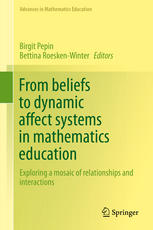

Most ebook files are in PDF format, so you can easily read them using various software such as Foxit Reader or directly on the Google Chrome browser.
Some ebook files are released by publishers in other formats such as .awz, .mobi, .epub, .fb2, etc. You may need to install specific software to read these formats on mobile/PC, such as Calibre.
Please read the tutorial at this link: https://ebookbell.com/faq
We offer FREE conversion to the popular formats you request; however, this may take some time. Therefore, right after payment, please email us, and we will try to provide the service as quickly as possible.
For some exceptional file formats or broken links (if any), please refrain from opening any disputes. Instead, email us first, and we will try to assist within a maximum of 6 hours.
EbookBell Team

4.8
104 reviewsThis book connects seminal work in affect research and moves forward to provide a developing perspective on affect as the “decisive variable” of the mathematics classroom. In particular, the book contributes and investigates new conceptual frameworks and new methodological ‘tools’ in affect research and introduces the new field of ‘collectives’ to explore affect systems in diverse settings.
Investigated by internationally renowned scholars, the book is build up in three dimensions. The first part of the book provides an overview of selected theoretical frames - theoretical lenses - to study the mosaic of relationships and interactions in the field of affect. In the second part the theory is enriched by empirical research studies and provides relevant findings in terms of developing deeper understandings of individuals’ and collectives’ affective systems in mathematics education. Here pupil and teacher beliefs and affect systems are examined more closely. The final part investigates the methodological tools used and needed in affect research. How can the different methodological designs contribute data which help us to develop better understandings of teachers’ and pupils’ affect systems for teaching and learning mathematics and in which ways are knowledge and affect related?